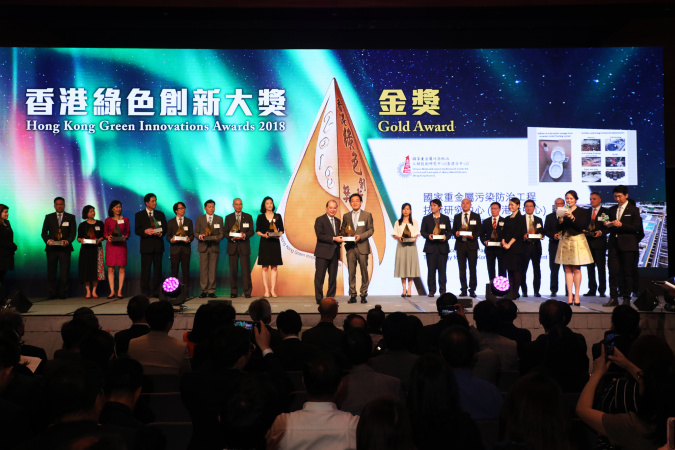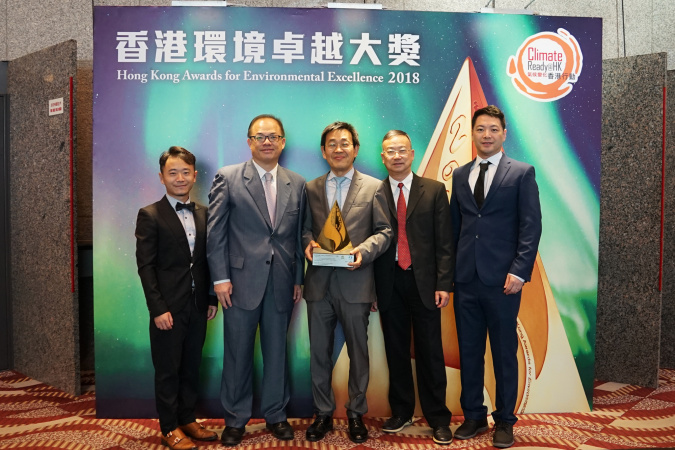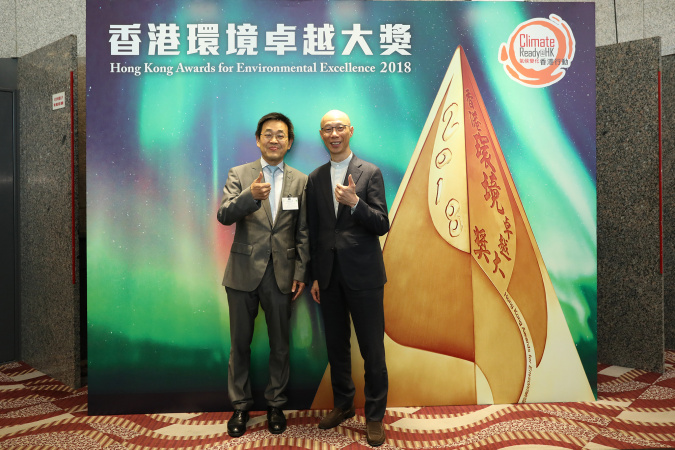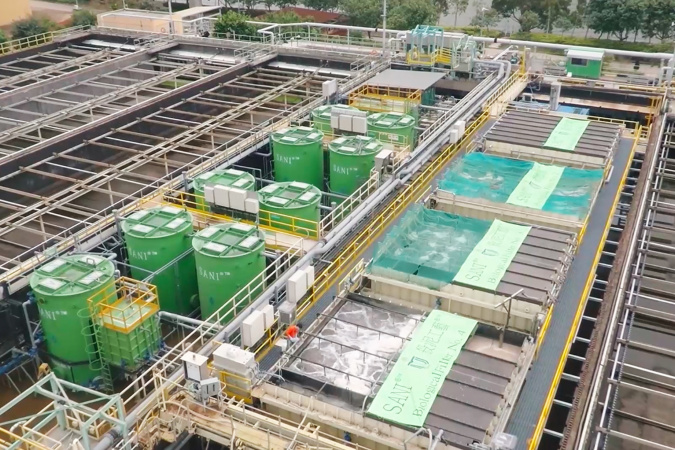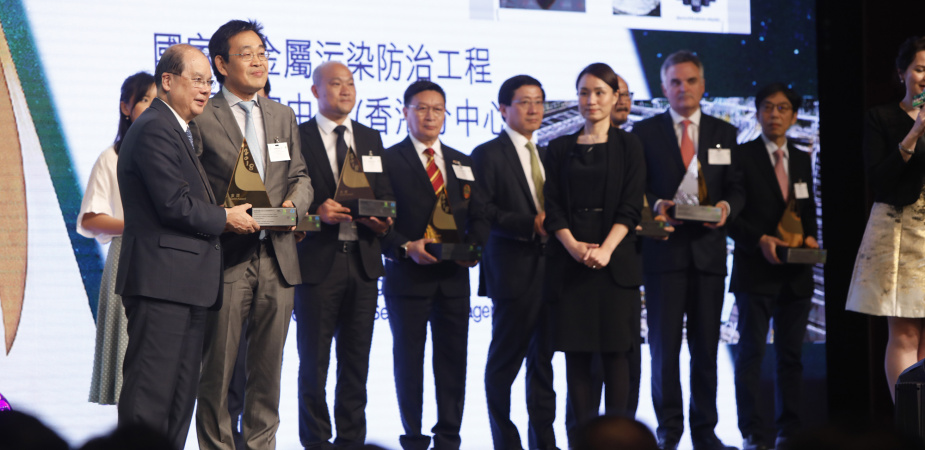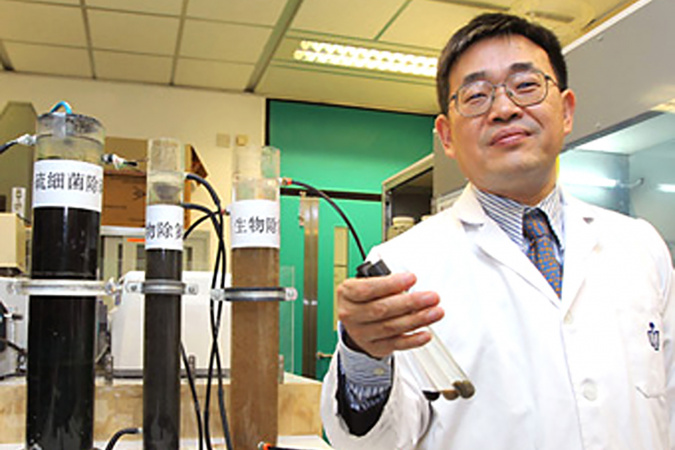Gold at the End of the Sewer: HKUST's SANI Process team received Hong Kong Green Innovations Awards' top accolade - the Gold Award
A seasoned academic from The Hong Kong University of Science and Technology (HKUST), who has spent well over a decade with filthy and stinky wastewater, finally strikes gold for his innovative process for sewage management.
Prof. CHEN Guanghao, Chair Professor in the Department of Civil and Environmental Engineering and Director of the Chinese National Engineering Research Center for Control and Treatment of Heavy Metal Pollution (Hong Kong Branch), received a prestigious award for innovation from the hands of Mr. Matthew CHEUNG Kin-Chung, Acting Chief Executive of the Hong Kong Special Administrative Region (HKSAR) at the presentation ceremony of the Hong Kong Awards for Environmental Excellence 2018 held at the Hong Kong Convention and Exhibition Centre on April 29, 2019.
The recognition, the Gold Award, was the top accolade in the 2018 Hong Kong Green Innovations Awards (HKGIA) co-organized by the Environmental Protection Department and the Environmental Campaign Committee. The title of the innovation is “SANI® Process – a Paradigm-shift Technology for Hong Kong Sewage Management”.
SANI is an acronym for the “Sulfate reduction, Autotrophic denitrification and Nitrification Integrated” process.
“I am really thrilled to receive this recognition with the team, after 15 years of continued research and testing to develop an innovative, energy-efficient and low-carbon technology for sewage treatment, leveraging Hong Kong’s unique seawater toilet flushing system,” said Prof. Chen.
"The idea to pursue this project actually dates far back to 1995, when I joined HKUST. I started to identify the biggest issues in my field, and it turned out to be how to minimize sludge production. If the problem of sludge production is not tackled, it will incur high interim costs and result in potential secondary pollution. So I started to examine how to reduce sludge production at source, thereby significantly reducing the cost of sewage treatment.”
"I had a very good friend Mark van Loosdrecht – a world-famous expert in the field. He came to visit me. He knew what I was doing. He observed that Hong Kong uses seawater for toilet flushing, and suggested that there could be some solution for sludge minimization at source that might be different from other parts of the world.”
"His words inspired me to look deeper. I knew there is sulfate in seawater, so I made sulfate the starting point of my investigation. Then I started to dig deeper, and came up with the SANI® system, which provides a new solution that minimizes sludge production naturally,” said Prof. Chen.
Project History in a Nutshell
Research on the SANI® Process started in 2004 at the HKUST. Laboratory-scale tests were conducted up to 2006.
Between 2007 and 2010, a pilot-scale test was conducted in conjunction with the Drainage Services Department at the Tung Chung Sewage Pumping Station.
More recently, between 2013 and 2015, large-scale tests were carried out at the Sha Tin Sewage Treatment Works.
Results were very positive. The novel technology eliminated 70 percent of sewage sludge production, while space requirement could be reduced by half. On top of these, greenhouse gas emissions could be up to 20 percent lower in comparison with the current sewage treatment works in Sha Tin.
Technological Breakthrough
Traditional biological wastewater treatment uses oxygen and facultative microbes to convert organic pollutants into carbon dioxide, thus cleaning up the sewage. On the other hand, the SANI® Process uses sulfate-reducing bacteria, with sulfate originating from the seawater used in Hong Kong’s unique toilet flushing system as the electron carrier, to oxidize organic carbon into carbon dioxide and reduce oxidized nitrogen into nitrogen gas under anaerobic and anoxic conditions respectively. During this process, sulfate is reduced to sulfide, and then oxidized back to sulfate, thus sustaining a natural cycle of sulfate coming from and returning to the sea alternately. Most importantly, the SANI® Process closes up the loop between fresh and saline water supplies, promotes seawater as an alternative economic water resource, and transforms the sewage treatment landscape.
Seawater toilet flushing using this new treatment method has been recognized by the International Water Association (IWA) as one of the most successful water management systems in the world, and Prof. Chen was elected Distinguished Fellow of IWA – the first Hong Kong academic to receive this exceptional honor.
He said, “The real challenge now is how to apply this in the real world as soon as possible. The water industry is super conservative. We are lucky to have the support of the Drainage Services Department, which is converting our SANI® demo plant into a real plant to train their engineers and technicians for real applications in Hong Kong.”
Accolades Along the Way
The SANI® Process has amassed numerous awards prior to the HKGIA - Gold Award this year.
In 2012, the technology won no less than five international awards, including the Huber Technology Prize of Germany, the finalist award in the World Smart Cities Awards of Spain, as well as three prestigious awards from the IWA, namely the East Asia Project Innovation Award (PIA) Honor Award in Applied Research, the Sustainability Prize, and the Global Grand PIA Honor Award in Applied Research. In 2018, the team was further awarded the IWA PIA Bronze Medal Award for Category: Breakthroughs in Research and Development, the first team from Asia.
Prof. Chen’s team was also invited by the UNESCO-IHE Institute for Water Education to take part in a four-year research to modify this practice to help developing countries suffering from water scarcity in their coastal regions. To recognize Prof. Chen’s outstanding contribution to the scientific and technological development of novel sewage treatment processes, IWA Publishing has invited him to lead the second edition of its bestselling technical book - Biological Wastewater Treatment: Principle, Modelling and Design, which will incorporate the SANI® Process in the book for the first time.
Biggest Sponsorship to Support Implementation
Looking back, the development of the SANI® Process has been supported on an unprecedented scale, under the joint sponsorship of the Innovation and Technology Fund, the Drainage Services Department, the HKUST, as well as other parties. The total sponsorship has amounted to HK$33 million to date, the biggest sponsorship for a single environmental technology development project in Hong Kong.
Notwithstanding great local support, interest in the SANI® Process is certainly not confined to Hong Kong. Prof. Chen is delighted that a lot of companies from the Mainland are lining up to learn how to put this technology into real application.
He added, “We must remember that any new sewage technology usually takes about 20 years to launch in the real world. We are now about 15 years down the line. I am very confident that in the next 5 years, SANI® will be applied in Hong Kong and beyond.”
About The Hong Kong University of Science and Technology
The Hong Kong University of Science and Technology (HKUST) (https://hkust.edu.hk/) is a world-class research university that focuses on science, technology and business as well as humanities and social science. HKUST offers an international campus, and a holistic and interdisciplinary pedagogy to nurture well-rounded graduates with global vision, a strong entrepreneurial spirit and innovative thinking. HKUST attained the highest proportion of internationally excellent research work in the Research Assessment Exercise 2014 of Hong Kong’s University Grants Committee, and is ranked as the world’s best young university in Times Higher Education’s Young University Rankings 2019. Its graduates were ranked 16th worldwide and top in Greater China in Global University Employability Survey 2018.
